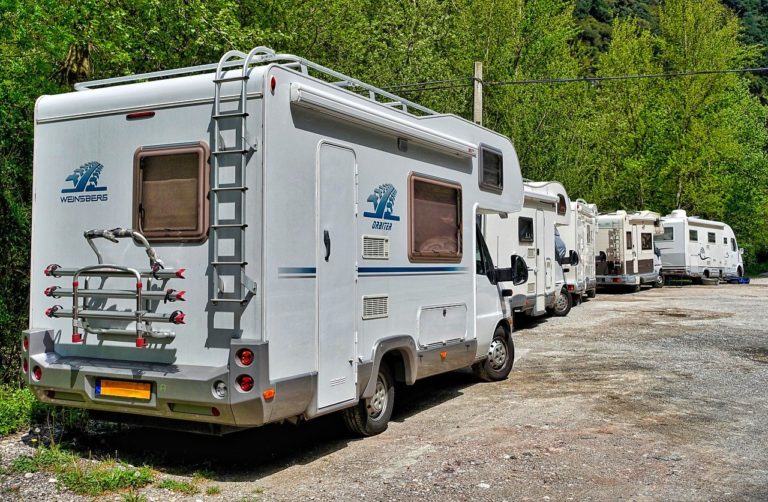The Road to Success: How to Choose the best Tires for Your RV
Selecting the right tires for an RV is crucial for ensuring a safe and comfortable journey. Tires are the only point of contact between the RV and the road. They are responsible for bearing the weight of the vehicle and its contents like you and your belongings! Choosing the wrong type of tire can result in a number of issues. Including blowouts, poor handling, reduced fuel efficiency, and more. RV tires also need to be able to withstand prolonged periods of storage without flat-spotting or cracking. As many RVs are only used seasonally. It’s important to do your research and select tires that are specifically designed for the weight and size of your RV. As well as the type of driving conditions you’ll encounter on your travels.

Pick The Right RV Tire For Your Needs
Using the wrong tires on an RV can lead to several risks, including blowouts, poor fuel economy, and reduced handling and stability. RVs are heavy vehicles that require special tires designed to handle their weight and provide proper traction on the road. If an RV owner uses tires that are not rated for their vehicle’s weight, they risk blowouts. That can lead to accidents, damage to the RV, and injury to its occupants. Additionally, using the wrong tires can negatively impact fuel economy, reducing the RV’s gas mileage and increasing costs. Finally, the wrong tires can also result in poor handling and stability. This makes the RV harder to control on the road and increasing the risk of accidents. Therefore, it is crucial to select the right tires for an RV to ensure safety and optimal performance.
Different Types of RV Tires
There are several types of RV tires to choose from, each with their own unique features and benefits. Here are some of the most common types are all-season tires, Summer tires, Winter tires, all-terrain tires and trailer tires. Let’s go over each type in more detail.

All Season RV Tires
All-season RV tires are designed to perform well in a wide range of weather conditions, including dry, wet, and light snow conditions. These tires are ideal for RVers who frequently travel across different regions with varying weather patterns. All-season tires are constructed with a unique tread pattern that offers enhanced traction and grip on both wet and dry surfaces. They also feature a softer rubber compound that allows them to remain flexible in colder temperatures, which improves their performance on snow-covered roads. However, all-season RV tires may not be the best choice for severe winter conditions, such as heavy snowfall or icy roads, as they may not provide enough traction and stability in these extreme conditions.
Summer RV Tires
Summer RV tires are designed to perform well in hot and dry weather conditions, with an emphasis on handling and grip. They usually have shallower tread depths and stiffer sidewalls to improve handling and stability when driving at high speeds on highways. However, summer tires are not ideal for use in wet or rainy conditions, as they have less effective traction on wet surfaces than all-season tires. Therefore, if you plan to travel in areas with variable weather, you may want to consider other options such as all-season or winter tires.
Winter RV Tires
Winter RV tires, also known as snow tires or cold weather tires. They are designed to provide enhanced traction in snowy and icy conditions. They feature specialized rubber compounds that remain pliable in cold temperatures. As well as unique tread patterns with deeper grooves and more biting edges to grip through snow and slush. Some winter RV tires also feature studs for additional traction on ice. However, it is important to note that winter RV tires should only be used during the winter season. And they should be swapped out for all-season or summer tires during warmer months.
All Terrain RV Tires
All-terrain RV tires, also known as off-road tires, are designed to provide excellent traction and handling on a wide range of surfaces. Including dirt, gravel, mud, and rocks. They are ideal for RVers who like to go off-road and explore remote locations. As they provide enhanced durability and stability for your RV. All-terrain RV tires have deeper treads, larger voids, and stronger sidewalls than standard RV tires. Which help them resist punctures and other damage from rough terrain. They are also often designed to operate at lower air pressures. Which helps them conform to uneven surfaces and provide better traction.
RV Trailer Tires
RV trailer tires are specifically designed for use on travel trailers, fifth wheels, and other types of towable RVs. They are constructed with sturdy sidewalls to handle the weight of the trailer. As well as a tread pattern that can handle various road conditions. RV trailer tires come in a range of sizes and load capacities. These all accommodate different types of trailers and the weight they carry. It’s important to choose trailer tires that are specifically designed for use on RVs. As using passenger car tires or other types of tires can increase the risk of tire failure and accidents on the road.

Understanding How To Read RV Tires
RV tire labels and markings can be confusing, but it’s important to know how to read them to ensure you are choosing the right tire for your RV. The first thing to look for is the tire size. The tire size is usually expressed as a series of numbers and letters (e.g. 225/75R16). The first number is the width of the tire in millimeters. The second number is the aspect ratio (the height of the sidewall as a percentage of the width). And the letter indicates the type of tire construction (e.g. “R” for radial). The next number is the diameter of the wheel in inches.
The load range is also important and is indicated by a letter (e.g. “C”, “D”, or “E”) on the sidewall of the tire. This letter indicates the maximum weight that the tire can safely carry at a specific air pressure. You should choose a tire with a load range that meets or exceeds the weight of your RV.
The speed rating is another important factor and is indicated by a letter (e.g. “L” or “M”) on the tire. This indicates the maximum speed at which the tire can safely operate. Make sure you choose a tire with a speed rating that is appropriate for the type of driving you will be doing in your RV.
Finally, look for the DOT number on the tire. The DOT number indicates that the tire meets Department of Transportation standards for safety and performance. You’ll want a DOT rating that is current and not too old. If it’s more than a few years old they could start to have problems like dry rot. Be sure to look out for deals that seem to good to be true. They may be some old tires someone is swindling you with.
Select The Correct Size For Your RV
Selecting the right size RV tire is crucial for a safe and efficient ride. Using tires that are too small or too large for your RV can result in poor handling, decreased fuel efficiency, and even tire blowouts. It’s important to refer to your RV owner’s manual or tire placard. This will determine the appropriate tire size and load capacity for your specific RV make and model. Additionally, when shopping for replacement tires, it’s essential to choose tires with the same load rating and speed rating as the original equipment tires. This helps to maintain the safety and performance of your RV.
Weight Rating & Load Capacity of RV Tires
Weight rating is an important factor to consider when selecting tires for an RV. The weight rating of a tire is the maximum weight it can safely carry when inflated to the recommended pressure. It is essential to choose tires that can support the weight of the RV and its contents. Overloading a tire can lead to tire failure, blowouts, and accidents. To determine the right weight rating for your RV, you will need to know its gross vehicle weight rating (GVWR). This is the maximum weight that the RV is designed to carry, including passengers, fuel, and cargo. You can find the GVWR in the RV owner’s manual or on a label inside the RV. Select tires with a weight rating that meets or exceeds the GVWR of your RV. Do this to ensure your safety on the road.
The load capacity of RV tires is a critical factor to consider when selecting the right tires for your vehicle. It refers to the maximum amount of weight that the tire can safely carry at a given inflation pressure. The load capacity is typically indicated by a number on the tire sidewall, known as the load index. For example, a tire with a load index of 110 can carry up to 2,337 pounds of weight at the maximum recommended inflation pressure. It’s important to ensure that the tires on your RV are rated to support the weight of your vehicle. Be sure to include any cargo or passengers, to ensure safe and reliable travel. Overloading your RV tires can lead to blowouts or other dangerous situations on the road.

Weather & Terrain Conditions For RV Tires
Weather and terrain conditions are important factors to consider when selecting RV tires. Different types of tires are designed to perform optimally under specific weather and terrain conditions. For example, all-season tires are designed to provide good performance in a wide range of conditions, including dry, wet, and light snow. On the other hand, winter tires are designed to perform well in colder temperatures and snow. While summer tires are optimized for performance in warmer temperatures. When it comes to terrain, all-terrain tires are designed to handle both on and off-road driving conditions. While highway tires are best for paved roads and highways. It’s important to consider the weather and terrain conditions you’ll be encountering during your travels and choose the right RV tires accordingly.
Durability & Lifespan Of RV Tires
Durability and lifespan are important factors to consider when selecting RV tires. RV tires typically last for around 5 to 7 years, but this can vary depending on several factors such as usage, storage, and maintenance. It’s important to inspect your RV tires regularly for any signs of wear, such as cracking or bulging, and to replace them if necessary. Additionally, proper maintenance such as regular inflation, alignment, and rotation can extend the lifespan of your RV tires. Choosing high-quality and durable RV tires can also help ensure a longer lifespan and reduce the risk of blowouts or other tire-related issues while on the road.

RV Tire Tread Pattern & Design
The tread pattern and design of an RV tire play a crucial role in its overall performance. The tread design refers to the pattern on the surface of the tire that comes into contact with the road. Different tread patterns are designed to provide specific benefits such as better traction, improved handling, and reduced noise.
For RV tires, a deeper tread depth is generally preferred as it can provide better traction in wet or slippery conditions. The tread pattern should also be optimized for the type of terrain the RV will be traveling on. For example, tires designed for off-road use will typically have a more aggressive tread pattern than those designed for highway driving.
Additionally, some RV tires may feature special designs or technologies to improve their overall performance. For example, some tires may have wider grooves or channels to improve water evacuation and reduce the risk of hydroplaning. Others may have special sipes or biting edges to provide better traction on snow and ice. Ultimately, the tread pattern and design of an RV tire should be carefully considered based on the specific needs and conditions of the RV owner.
RV Tires Price & Value
When it comes to RV tires, price and value for money should also be considered. Generally, RV tires can be expensive, but it’s important to invest in high-quality tires that will provide safety and reliability on the road. Cheaper tires may seem like a cost-effective solution at first, but they may not offer the same level of performance and longevity as more expensive options. It’s important to research and compare different brands and models to find the best value for money. Keep in mind that the most expensive tires may not always be the best choice, but don’t be afraid to spend a little more on high-quality tires that will last longer and provide better performance. In the long run, it could save you money and provide greater peace of mind.
Maintaining & Extending Life Of RV Tires
Maintaining and extending the life of RV tires is important to ensure safe travels and avoid costly replacements. One important factor is proper inflation. RV owners should check their tire pressure regularly, especially before long trips. Overinflation and underinflation can both cause damage to the tires and affect handling. RV owners should also consider investing in a good quality tire gauge and air compressor.
Another factor is proper storage. RV tires should be stored in a cool, dry place away from direct sunlight and other sources of heat. It’s also a good idea to cover them to protect them from UV rays and environmental debris. RV owners should also inspect their tires regularly for signs of damage, such as cracking or bulging, and replace them if necessary.
Lastly, it’s important to rotate RV tires regularly. This can help to distribute wear and ensure that they wear evenly. Tire rotation should be done based on the manufacturer’s recommendations, and RV owners should make sure to also inspect the tread and check for signs of uneven wear.
RV Tire Maintenance & Inspection
Regular inspections and maintenance of RV tires are crucial to ensuring their longevity and safety while on the road. It is recommended that RV owners inspect their tires before every trip and check for any signs of damage or wear, such as cracks, punctures, or uneven wear patterns. Additionally, proper inflation is essential for extending the life of RV tires and ensuring they can handle the weight of the RV. RV owners should also rotate their tires regularly to ensure even wear and consider investing in a tire pressure monitoring system to help detect any potential issues before they become major problems. Finally, it’s important to store RV tires properly when not in use to prevent damage from exposure to sunlight or extreme temperatures.
Proper RV Tire Inflation
Proper tire inflation is crucial for ensuring the safety and longevity of RV tires. Underinflated tires can lead to excessive heat buildup, which can cause blowouts and other tire failures. Overinflated tires, on the other hand, can lead to decreased traction and handling, as well as uneven tire wear. It’s important to follow the manufacturer’s recommended tire pressure for your specific RV model, and to regularly check tire pressure with a reliable tire gauge. Tire pressure should be checked when the tires are cool, before driving, and should be adjusted as needed. Maintaining proper tire inflation can also improve fuel efficiency and help extend the life of your RV tires.
Rotating & Balancing RV Tires
Rotating and balancing RV tires is an important part of tire maintenance. This process involves moving them from one position to another, such as from front to back or side to side, in order to promote even wear across all tires. Balancing involves adding or removing weight to ensure that the tire spins evenly while in motion. Regularly rotating and balancing RV tires can help to extend their lifespan and improve the overall performance and safety of the RV. It is recommended to rotate and balance RV tires every 5,000 to 7,000 miles, or every six months.
Storing RV Tires
Proper storage of RV tires when not in use is crucial for extending their lifespan. When RV tires are left in one position for an extended period of time, they can develop flat spots, which can cause a rough ride and even lead to tire failure. To avoid this, it is recommended to remove the tires from the RV and store them in a cool, dry place away from sunlight and other damaging elements. When storing the tires, it is important to keep them off the ground using a tire rack or other similar device. It is also recommended to cover the tires with a tire cover to protect them from the elements.
When To Replace RV Tires
Knowing when to replace RV tires is crucial to ensure safety and optimal performance while driving. Typically, RV tires should be replaced every 5 to 7 years regardless of mileage. As the rubber compounds can deteriorate over time, even if the tires have not been used. Additionally, if there are any signs of wear or damage, such as cracks, bulges, or punctures, the tires should be replaced immediately. It’s important to regularly inspect the tires and check the tread depth. Make sure your tire’s treads are still within safe limits. Another indicator that it’s time to replace RV tires is if the vehicle is experiencing any vibration or handling issues while driving. Ultimately, it’s better to err on the side of caution and replace RV tires sooner rather than later. This ensures the safety of all passengers and the RV itself.
RV Tires: A Conclusion
Selecting the right tires for your RV is an important decision that shouldn’t be taken lightly. Your tires are the only thing connecting your RV to the road, and making the wrong choice can lead to a range of problems. Using the wrong tires can lead to reduced fuel efficiency, decreased handling and stability, and even dangerous blowouts. It’s important to consider factors such as load capacity, weather and terrain conditions, and tire durability and lifespan when selecting your tires.
Investing in quality RV tires may cost more upfront. But it can save you money and headaches in the long run. Poor quality tires may wear out quickly, require frequent replacements, and even lead to accidents. By investing in high-quality tires and properly maintaining them is very important. You can extend the tires’ lifespan and ensure your safety on the road.
In summary, selecting the right tires for your RV and properly maintaining them is crucial. It’s crucial for your safety and the longevity of your tires. Invest in high-quality tires that meet your RV’s load and terrain requirements. And stay on top of regular maintenance and inspections! By doing so, you’ll enjoy a smoother ride and peace of mind on your next RV adventure.









